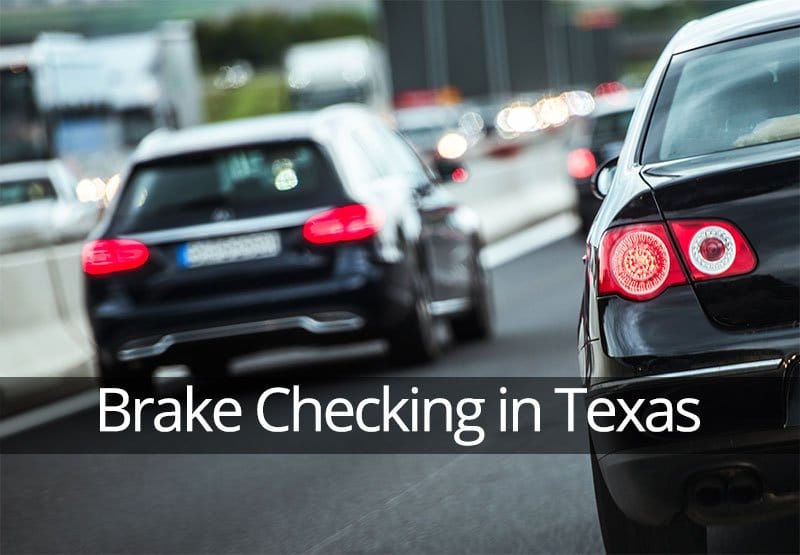Understanding the laws of your state is vital to making informed decisions and keeping you and your family safe. Road laws vary from state to state, and brake checking laws can be hard to navigate.
Whether brake checking is done out of spite or because someone is trying to get their point across, it is a dangerous maneuver, putting drivers, passengers, and their cars in jeopardy.
What is Brake Checking?
Brake checking is a form of road rage where a driver in front of another quickly slams on their brakes, making the car that was following them brake quickly to avoid an accident.
Sometimes the brake check is a quick tap, but sometimes the front car comes to a full stop. Regardless of how intensely the brakes were applied, the intent is to cause an accident or severe distress to the car and driver who were following.
Often, brake checking leads to more heated situations when both cars pull over. As both drivers are now angry, an altercation or violent act is not uncommon between the drivers following the accident. If you have been the victim of a brake checking accident, it is vital to take the measures to keep you safe and bring justice to the situation.
Why do People Brake Check?
Brake checking is usually done in order to teach someone a lesson or for someone who was angry let off steam.
Often, the driver desires to cause a small collision.
There is a false assumption that in any rear-end collision, the rear driver is always at fault. This perception may give a driver the desire to brake check, thinking that it cannot be their fault if a collision does happen.
However, the driver that was rear-ended can be at fault.
Brake checking occurs after someone merges too close to a vehicle, and the driver wants to show the other driver that cut them off what it felt like.
Another example would be if someone were following too close or tailgating. This is a common frustration for drivers, as most do not want someone within bumping distance of their hard-earned vehicle.
Other times, a car that has been driving slow or under the speed limit is passed and brake-checked. In this instance, the driver wants the following car to understand the annoyance or pain of going slow. They may also be punishing the slow driver if they were going to be late to a meeting.
Whatever the reason, most people brake check to tell another driver they were upset by them. They want the other driver to feel pain and frustration, just like they did. Whether it was following too close, a tight merge, or tailgating, there is never a good reason to brake check another driver.
Is Brake Checking Illegal?
The State of Texas Transportation Code states that a car following another must maintain a safe stopping distance between the two vehicles.
However, the state also prohibits reckless driving, which is defined as “willful or wanton disregard for the safety of persons or property.â€
In the case of someone brake checking, they are trying to cause an accident or teach a lesson. Either way, they are choosing to do a dangerous activity without taking others’ safety into account.
Brake checking, when done on purpose to cause the driver in the back to brake quickly and possibly rear-end the front car, is reckless driving, and therefore illegal in Texas.
However, as intent is a defining feature of reckless driving when it comes to brake checking, it can be difficult to prove.
Alternatives to Brake Checking
If you have found yourself in a frustrating situation while driving, it is best to consider an alternative to this illegal maneuver. There are many different options you can do, depending on the situation.
If you are following someone who is driving very slowly, wait until there is a dotted center line to pass. Make sure you pass legally and maintain your speed when you pass the slow car. While it can be tempting to tap your brakes to tell them how slow they were going, it is best to move on at the legal speed limit.
If someone is tailgating you, a common response is to want them to back off a bit. Rather than brake checking, consider pulling over for a moment so they can pass. Perhaps you are simply going for a drive, but they are late for a meeting. Simply let the fast car proceed ahead and wait until you are not frustrated to drive again.
Merging, especially in some of Texas’ larger cities, can get a bit messy.
People often claim more space than they need, and this ends up frustrating many drivers, especially after a long day of work. If someone has merged close to you and upset you, simply put on your brakes and give them plenty of room.
Brake checking is never the correct action to take.
Instead, there is a myriad of alternatives that keep a safe distance between you and other cars and allow you to cool off.
If you are following a car that taps their brake lights a few times, this may be an indication they think you are following too close. Give them a little extra space to keep the situation from escalating.
So You’ve Been in a Brake Check Accident – What Now?
Even if you’ve done everything you can think to do to avoid a brake checking wreck, they still happen.
Here are a few steps to follow if you have rear-ended a vehicle that you believe brake checked you:
- Take a deep breath and stay calm. The driver in front of you may be quite upset.
- Make sure everyone is safe by pulling over to the side of the road and checking yourself and your passengers for cuts, scrapes, or other injuries.
- Call 911. This is essential if someone has been injured. But, the police can help everyone understand what happened and see if brake checking was involved. Their report is invaluable in proving what actually happened.
- Write down as much information as you can. Take a picture or write down the driver’s name, car make and model, and license plate number. If there are any witnesses, get their name and number if possible. Take a photo of any injuries to you or your passengers, as well as anything broken or damaged on both cars.
- Contact your insurance company. Insurance companies will walk you through repairing your car and getting you safely to where you need to be.
- Hire a car accident lawyer to navigate this situation with you.
Brake checking should never be taken lightly. Even if there were no injuries, someone who has one instance of road rage is likely to do it again. It is essential to see if the brake check was intentional and if so, to pursue it.
Rear-Ending Someone Who Brake Checks
Any car accident is scary, but rear-ending someone who brake checks can be nerve-wracking.
If you have rear-ended someone, there may be obvious injuries like a broken bone or whiplash. But, there are also quite a few injuries that may not be seen at first glance, especially when emotions are high. These injuries, like a herniated disk, concussion, or soft tissue damage, could pose many health complications in the future.
Because some of these injuries may not appear at first glance, anyone involved in the accident should go to the hospital for an evaluation. If it comes up later that injuries did happen, the driver who brake checked should be held accountable.
Also, if you have rear-ended someone, there may be some visible damage to your car. This may look like a cracked bumper, broken headlight, or a dented license plate. But, there could be less obvious issues too. These would be misaligned wheels, a broken hood latch, bent frame, or a broken sensor. While it may be tempting to shrug off the accident if there is no visible damage, it is crucial to get all the information and inform the authorities in case issues arise.
Who is at Fault for a Brake Checking Car Accident?
If someone quickly put on their brakes to purposefully cause an accident or to cause harm, they are at fault.
This is considered reckless driving and is punishable under Texas law.
However, establishing the fault in a brake checking accident is difficult.
Witnesses are the key to understanding the difference between a brake check incident and someone following too close and rear-ending the other when they came to an abrupt stop. Witnesses can tell if there was a reason for someone to stop abruptly, like a deer or dog running into the road.
Witnesses can be pedestrians, passengers in either car or other cars nearby who may have seen what happened.
When there are no witnesses, a dash cam can also help shed light on the situation. A dashcam is actually the best form of evidence, as it can physically show precisely what happened, rather than being a personal account that varies from witness to witness. If you have considered getting a dashcam, it will be a worthwhile investment and could help establish intent in a future brake check accident.
If it is shown that there was a reason for someone to stop abruptly, then it is not considered brake checking. These reasons could include construction, malfunctioning lights, or even a stop sign that the driver in front did not see. Even if the driver in front was angry, if they had an appropriate reason to stop quickly, they might not be at fault. Instead, an accident like this would be the fault of the driver in the back.
Because of this, whenever possible, keep a safe distance between your car and the vehicle in front of you.
Is Brake Checking Assault?
Brake checking can be considered aggravated assault in the state of Texas.
If the person who brake checked does serious bodily injury to someone else, then it can be tried as a felony.
Furthermore, if the vehicle is considered a deadly weapon, the charge can be increased to a first-degree felony.
Anyone involved in a rear-end wreck where brake checking is suspected must hire a lawyer to walk them through the situation. The punishment, if found guilty of aggravated assault, is punishable with up to ten years in prison and up to a $10,000 dollar fine.
Brake checking can quickly get out of hand.
When someone slams on the brakes, they may be hoping for just a small fender bender to annoy the driver in the back.
However, whatever the outcome, the brake checker should be held accountable. If the second car swerves off the road to avoid a collision and hits a rock, flipping the vehicle, the car in front is still responsible for the accident.
Even if the car in front was assuming there would be no injuries, the situation could escalate quickly by having severe injuries or even death.
What to Do if You’ve been in a Brake Check Wreck
Here at Stoy Law Group, our personal injury lawyers fully stand behind you and want you to get the help you need and deserve.
As Warriors for Justice, we encourage you first to ensure that everyone involved in the wreck is safe. Seek medical attention immediately. We also encourage you to take as many photos and statements as you can at the scene.
Work with law enforcement to ensure a smooth and complete accident report and comply with all of their requests.
The more information you can gather and provide to the police on the scene will help ensure a smooth prosecution. We will work with you to ensure that justice is served in your vehicle accident.
There is no excuse for road rage or brake checking.
We stand with you to provide you with exceptional legal representation, getting you the proper care, coverage, and justice you deserve.
If you have any questions, contact the Stoy Law Group office today.














